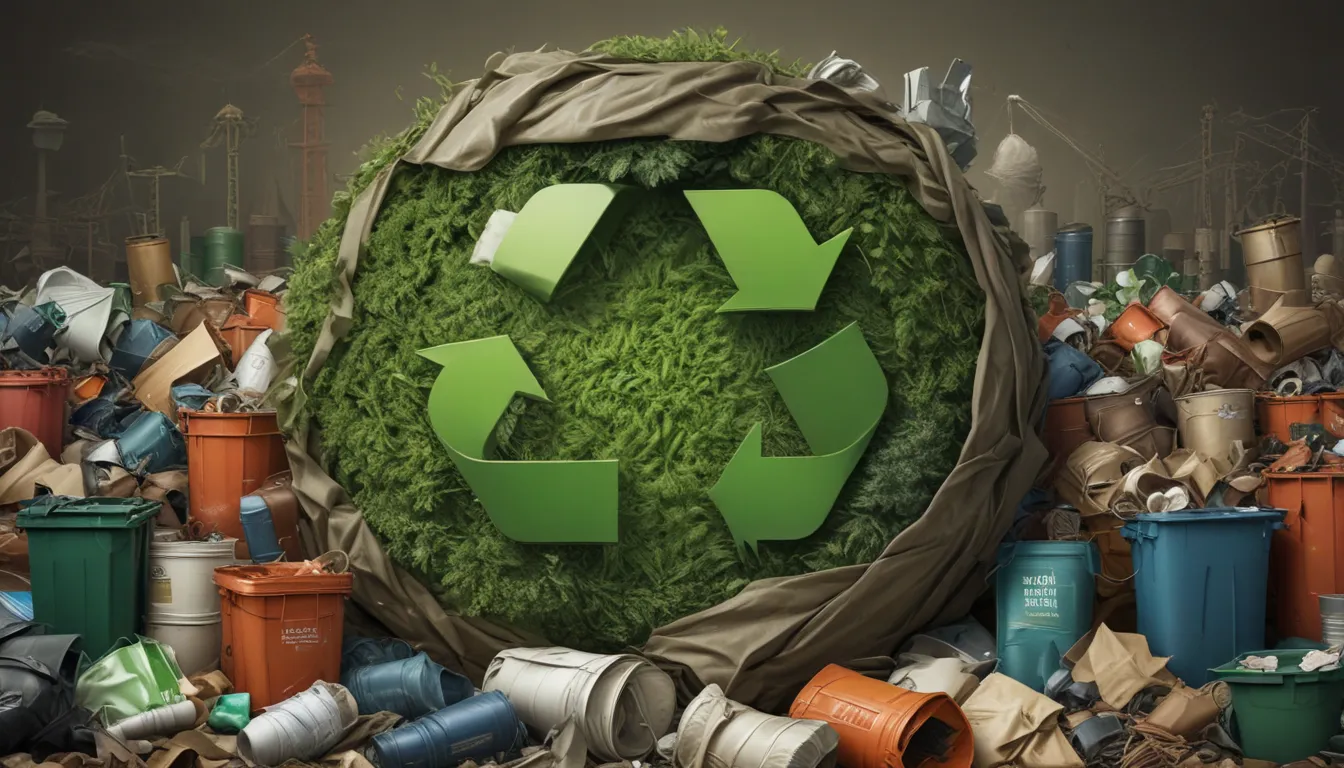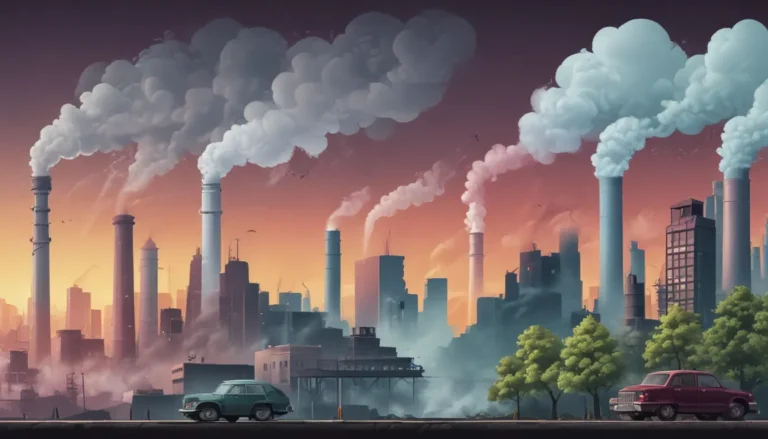A Note About Images: The images used in our articles are for illustration purposes only and may not exactly match the content. They are meant to engage readers, but the text should be relied upon for accurate information.
In today’s rapidly evolving world, waste management and recycling have emerged as critical components with a profound impact on our environment and future. It is imperative to grasp the significance of responsible waste disposal and the pivotal role recycling plays in combating environmental degradation. With advancing technology and escalating consumerism, waste management has become an urgent issue necessitating sustainable solutions.
Understanding the Impact: Key Facts and Figures
-
Recycling Energy Conservation: Recycling one aluminum can saves enough energy to run a TV for three hours. By engaging in recycling practices, we can effectively reduce energy consumption and contribute to environmental preservation.
-
Methane Emissions from Landfills: Landfills are the third-largest contributor to human-related methane emissions in the United States. Implementing proper waste management strategies can significantly decrease methane emissions and combat climate change.
The Surprising Statistics: Unveiling the Truth Behind Waste
The United States alone generates more than 250 million tons of waste annually, encompassing a wide range of sources from household trash to industrial waste. By embracing effective waste management practices, we can minimize our environmental footprint and curb the detrimental effects of excessive waste production.
Recycling is a powerful tool for conservation and sustainability, with the potential to profoundly impact our ecosystem. Recycling one ton of paper saves 17 trees, underscoring the importance of recycling not only for tree conservation but also for reducing water consumption and energy usage associated with paper production.
Despite the recyclability of approximately 75% of waste, only about 30% is actually recycled, highlighting the pressing need for heightened awareness and improved access to recycling facilities. A conscious effort to enhance recycling rates can lead to significant progress in reducing waste accumulation.
Addressing Environmental Concerns: Plastic Pollution and Greenhouse Gas Emissions
Plastic bottles can take around 450 years to decompose, emphasizing the long-lasting impact of plastic pollution on our environment. By minimizing the consumption of single-use plastics and actively recycling plastic bottles, we can contribute to mitigating the environmental consequences associated with plastic waste.
The act of recycling one glass bottle can save enough energy to power a computer for 25 minutes, showcasing the dual benefits of energy conservation and reduced greenhouse gas emissions achieved through glass recycling. By promoting glass recycling, we can alleviate the strain on natural resources and minimize the environmental impact of glass production.
Sustainable Solutions: Harnessing the Power of Recycling
Efficient waste management practices are essential in combating environmental challenges, particularly concerning methane emissions and energy conservation. For instance, recycling cardboard can save up to 25% of energy compared to producing new cardboard, highlighting the environmental and energy-saving benefits of cardboard recycling.
Electronic waste, or e-waste, contains valuable materials equivalent to billions of dollars, including precious metals like gold, silver, and palladium. Proper recycling and recovery of materials from e-waste not only conserve precious resources but also prevent toxic materials from polluting the environment.
Promoting Sustainable Living: Practical Steps Towards Waste Reduction
Food waste is a significant contributor to methane emissions when disposed of in landfills. By adopting practices such as proper meal planning, composting, and donating surplus food, individuals can actively reduce methane emissions and alleviate the strain on landfills.
Recycling plays a vital role in water conservation, with one ton of paper recycling saving 7,000 gallons of water. By recycling paper products, we can foster sustainable water usage practices and promote the conservation of this invaluable resource.
Conclusion: A Call to Action for a Sustainable Future
In conclusion, waste management and recycling are instrumental in shaping a sustainable future for our planet. By embracing responsible waste disposal practices and actively participating in recycling initiatives, we can contribute to a cleaner, healthier environment for present and future generations.
It is imperative for individuals, communities, businesses, and governments to collaborate in promoting waste reduction, recycling efforts, and the adoption of sustainable practices in daily life. Through continued efforts, awareness, and innovative solutions, we can harness the transformative power of waste management and recycling to build a brighter, more sustainable future.
Frequently Asked Questions
Q: Why is waste management important?
A: Waste management is essential for maintaining a clean and healthy environment, preventing pollution, protecting human health, and conserving natural resources.
Q: What are the benefits of recycling?
A: Recycling reduces the need for raw materials, conserves energy, reduces greenhouse gas emissions, creates jobs, and stimulates economic growth in the recycling industry.
Q: How can I reduce waste at home?
A: You can reduce waste at home by practicing mindful consumption, using reusable items, composting organic waste, and recycling materials such as paper, plastic, glass, and metal.
Q: How do recycling programs work?
A: Recycling programs collect recyclable materials, which are sorted, processed, and transformed into new products to divert waste from landfills and promote resource conservation.
Q: Can I recycle electronic waste?
A: Yes, electronic waste can be recycled at designated centers or retailers to ensure proper disposal and recovery of valuable materials.
Q: What happens to recycled materials?
A: Recycled materials are processed into raw materials for manufacturing new products, supporting a circular economy and sustainable resource utilization.
Q: How can businesses contribute to waste management?
A: Businesses can implement recycling programs, reduce waste through efficient processes, use sustainable packaging materials, and educate employees on waste reduction and recycling practices.
Q: Are there regulations for waste management?
A: Various countries and regions have regulations for waste management to ensure proper disposal, promote recycling, and prevent environmental pollution.
Q: What are innovative waste management solutions?
A: Innovative solutions include waste-to-energy technologies, composting, biodegradable packaging materials, and advanced recycling techniques to address waste management challenges.
Q: Can I recycle plastic bags?
A: Plastic bags can be recycled at specific facilities; however, it is advisable to check with local recycling programs for the proper disposal of plastic bags.
In conclusion, waste management and recycling stand as pillars of sustainability, offering a pathway to a greener, cleaner future. By embracing the principles of responsible waste disposal and active participation in recycling initiatives, individuals and communities can pave the way for a more sustainable tomorrow. Let’s join hands in championing waste reduction, recycling efforts, and sustainable practices to create a brighter future for generations to come.






